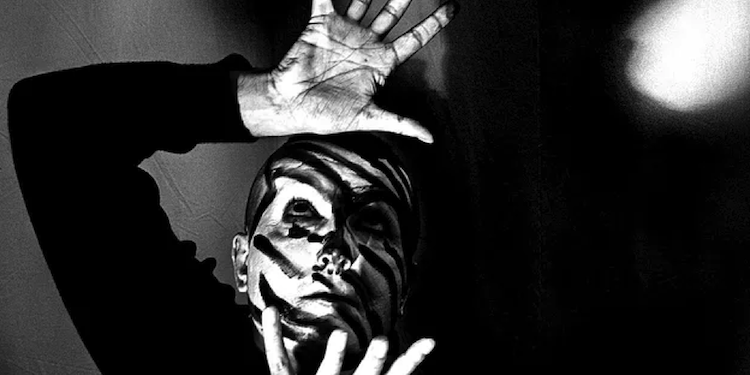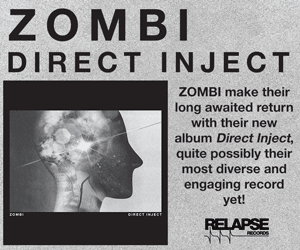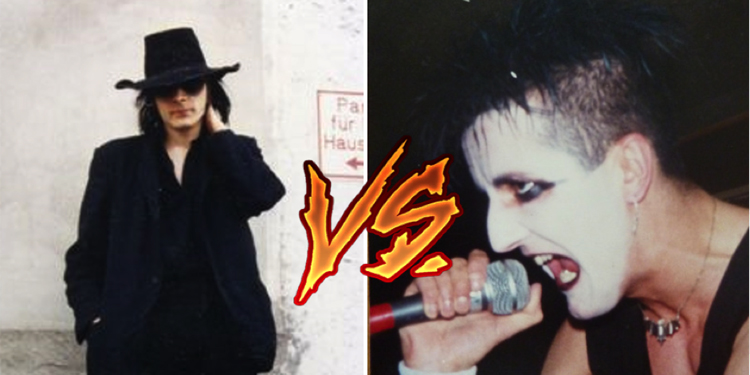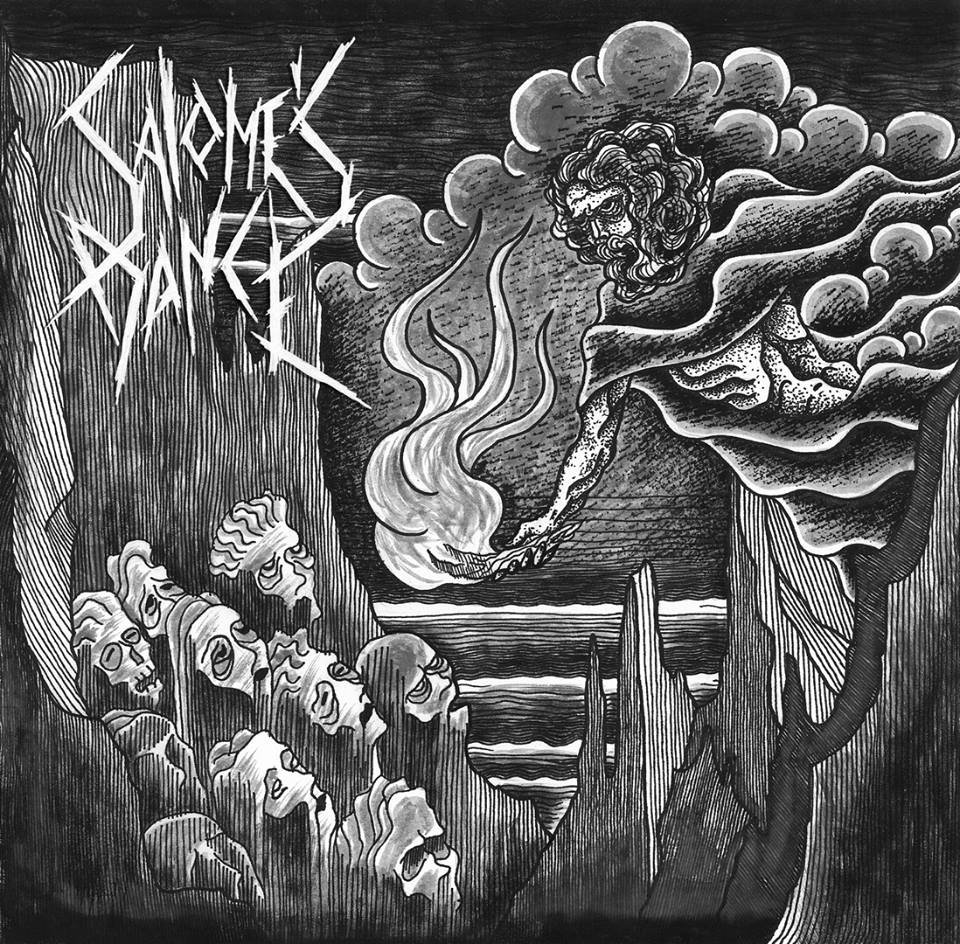Of all the many-coloured moths that first burst free of the original gothic rock chrysalis, Sex Gang Children were perhaps the most strident and unique – the patterns on their wings the most vibrant and distorted, their vision the most singular. Immediately creating waves amidst the cloistered environs of the Batcave, it wasn’t long before they were riding high in the independent charts, with major labels sniffing around the periphery of this off-kilter and supremely self-assured phenomena.
But line-up changes, circumstance and that name – oh lord, that name – threw innumerable roadblocks in their way; each of which was vaulted in style, but not without leaving some skin on the barricades.
Now over 30 years later, the original line up is back – with Andi Sex Gang being re-joined by guitarist Terry Macleay and Drummer Rob Stroud for the Electric Jezebel Tour in support of the recently released compilation of those early, enervating, engaging and infuriating singles.
In the interim, Andi, for his part never stopped producing challenging and evolving material – amassing a staggering catalogue of work that, whilst varying wildly in style, has retained an ever-present scent of a manifesto. A belief system. A fucking mission.
Basically, there was a lot to talk about.
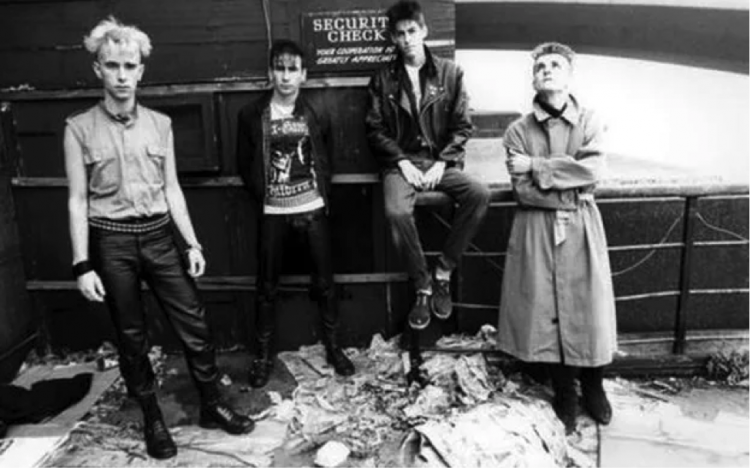
This reunion tour has been a long time coming, so in that spirit I’d like to return to the very start of the band as Panic Button – those heady early 80’s days when the palette was still un-smudged and you were finding yourselves and your sound. Can you describe the first time you guys got together in a room to play music?
Actually, it wasn’t really a case of being in a room all together for the first time. I had been trying out various musicians over a period of time throughout the latter half of 1981 and Rob was the first drummer that felt right, so he and I had been working together before Terry came on board.
A month or so later, I recruited Dave Roberts, who had previously worked with me in Panic Button for a brief spell, and at that point they all felt right for the task ahead. With the completion of this line up, the songs could be fully realised and translated as they should be. A lot of the arranging for the songs was done outside the rehearsal studio. A song was brought into that environment as a near complete piece of work. The rehearsal sessions were intense and disciplined, no jamming or meandering. That’s exactly how it was and it felt right.
How has the reunion tour been received? The Entremuralhas castle in Portugal was an auspicious venue for the debut.
The castle was a perfect setting for the first show. The Jezebel Tour itself was received with great warmth and enthusiasm. I think it was important to support the release of the early singles album Electric Jezebel with a live tour compromising the main players of those early songs. An idea suggested to me by Kevin Matthews.
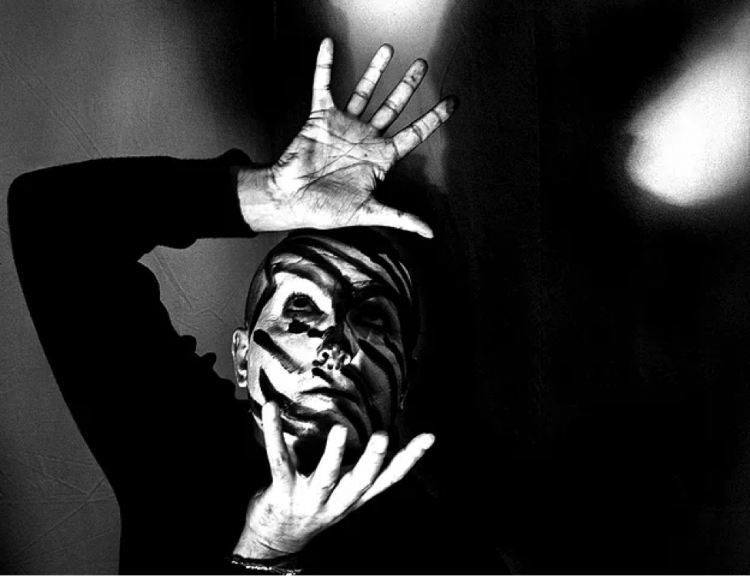
You’ve been playing some of these songs for years now but did Rob and Terry pick up where they left off? How were the dynamics and the elusive, all-important chemistry?
Obviously it took a few rehearsals to kick in, as neither Rob nor Terry had played these songs since those early tours and that was a long time ago. However, when it kicked in, it really kicked in.
No one ever quite managed to sound like Sex Gang Children. There was a drama and an angular singularity to the work which married with the heady themes you explored and rendered you utterly unique. Do you think that was a case of being untutored and unaware of all the rules you were breaking?
Untutored, yes. Self-taught, definitely. But we were aware of all the rules we were breaking. From the offset, I walked into the rehearsal studio and told the band we were going to smash the existing status quo. We were going to rewrite the rule book and work with our instincts. And through our music we would expose the sham of what passed as ‘rebellious music’ for what it was: paint-by-numbers bollocks.
There has always been a cultural and literary bent to your lyrics that sets you apart from other agitators. You weave the historical with the poetic/politik to create metaphor and allegory. What would you say your biggest influences have been in this regard?
Life and history itself. I think that whatever lies deep inside our souls, our inner conscious, finds a way to come to the fore, but one must live true to their soul in order for that to happen. We relive history every day of our lives, our past lives and snippets of our future journeys. Insofar as modern wordsmiths go, Leonard Cohen, Dylan Thomas, David Bowie, John Lydon. They do it for me.
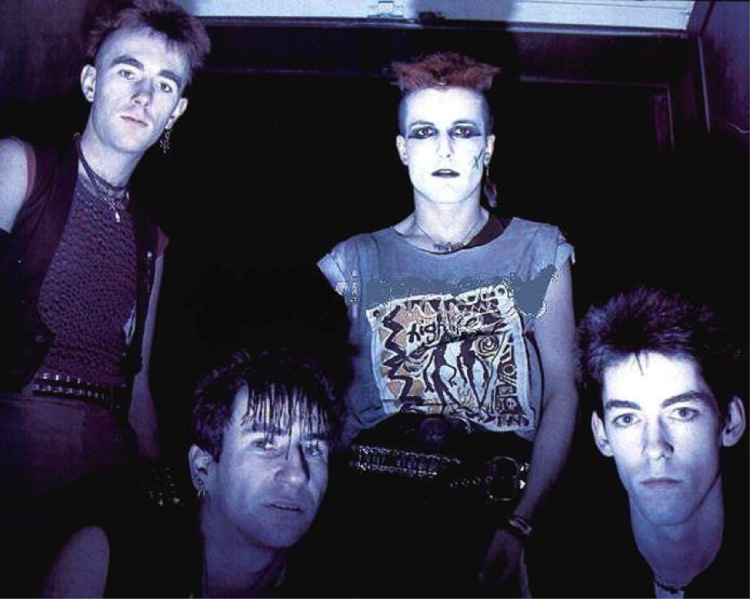
How much of yourself and your personal experience is reflected in these obsessions? Are these religious, historical and literary figures and motifs perhaps archetypal symbols you’re using to tell your own story?
Obsession, now there’s a funny word. It’s like a knife, you can use it to cut bread and feed people, or kill them. Me, I am never obsessed with my personal experiences, I just try to use them in a useful way. I will add that I have never written about something that I haven’t experienced myself or felt. However, I apply myself when it comes to words and music as a painter uses colour and shade. I don’t consciously think about it, it’s just my way. Personally, I do believe in the power of metaphor and the seduction of ambiguity.
I see you a little as Kinski’s Aguirre in Herzog’s Wrath of God, possessed with a singular wild-eyed steely obsession (obsession, possession, malnutrition rhythm!), and in fact you paid tribute to the man himself with an instrumental collection of the same name…
Ha Ha! I love Kinski! He was good crazy. When I lived in my old Victorian apartment in Brixton (which Ian Astbury and Billy Duffy had lovingly christened ‘Visigoth Towers’) in the very early 80’s, I used to frequent the Ritzy, an old Art Nouveau cinema just across the road from my flat and saw many great independent movies there. That’s where I discovered Herzog’s films for the first time, amongst many other great art delights. That place became my university of life at that time and just when I needed it. For your recommendation, if you haven’t already seen it, check out ‘Cobra’, another Herzog/Kinski collaboration.
Stylistically you’ve twisted, turned and taken tangents all over the place as somehow 35 years elapsed. What remains your constancy in terms of inspiration and intent?
Focus, fortitude and determination. Without art, life is an empty vacuum that means nothing. Just look around you.
As someone with such an expansive and varied back catalogue, I’m often surprised by some of the things that can fly under the radar. For example, for every ‘Song & Legend’ or ‘Medea’ there’s an equally brilliant ‘Veil’ or ‘Bastard Art’ that doesn’t seem to get enough love. Are there any of your offspring that you wish saw more sunlight?
Oh, that list is too long. People don’t always see things straight away and that’s okay. I think so long as the music is pure, it will have its day, even when the rest of us are dust and a distant memory. I look at it simply, music is my legacy, not the material goods we acquire
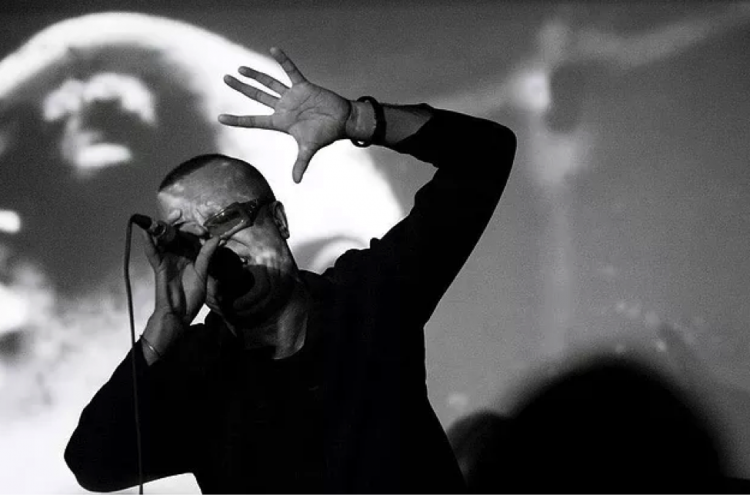
I had heard that much of the Veil LP was composed in prison? It’s a deeply fragile and beautiful album for something borne of that environment.
That is true, but I didn’t exactly have access to musical instruments or voice recorders. I had to keep it all in my head, including a lot of the instrument parts, for the whole ten months I was remanded. When I could, I was able to phone a friend (access to telephones was very limited) and leave a song idea, an instrument part, an arrangement or production note on the voicemail. So there I was, humming or singing away on the phone in a maximum security jail, getting my ideas saved, whatever it took. The rest remained on the carousel in my head. Jail was where I just happened to be when that album came to me. The experiences that bore that album were from my time in LA, previous to my incarceration. Music is a language that can never be stifled, no matter what the situation.
It must have been quite a coup to get the Spider From Mars Mick Ronson for the Arco Valley LP. Can you tell me a little about how that came about and what it was like working with Mick?
Mick and I had been introduced through a mutual acquaintance, Pete McCarthy. Apparently Mick had asked him for an SGC T-Shirt for his daughter Lisa. McCarthy had suggested to both Mick and myself that we should work together – this was just before we were about to record the album Blind!. Pete was pushing for Mick to produce it. I felt it would not be right for that album. Simon Boswell was our man for that one. However, Mick and I got on really well and hung out together for the next couple of years.
Once I had completed the songs for my next album Arco Valley after a long hard thought about it, I knew Mick was the right producer for that album. I had considered Simon (Boswell) and Tony James for the job, but Mick was a more prescient figure in my life at that time. So, after a night out in my local pub we were both pretty inebriated, back at ‘Visigoth Towers’, we were in my kitchen making coffee and I just turned round to Mick and said “You’re going to produce my next album” and that was that. Next day he came up and asked me to play him one of the new songs and we went on from there.
McCarthy had told me that Mick ‘feels’ music. If he clicks with it he’ll do it. I knew he would do it, even though at first he told me I couldn’t afford him (laughs). Since when did I ever let money get in the way of things?
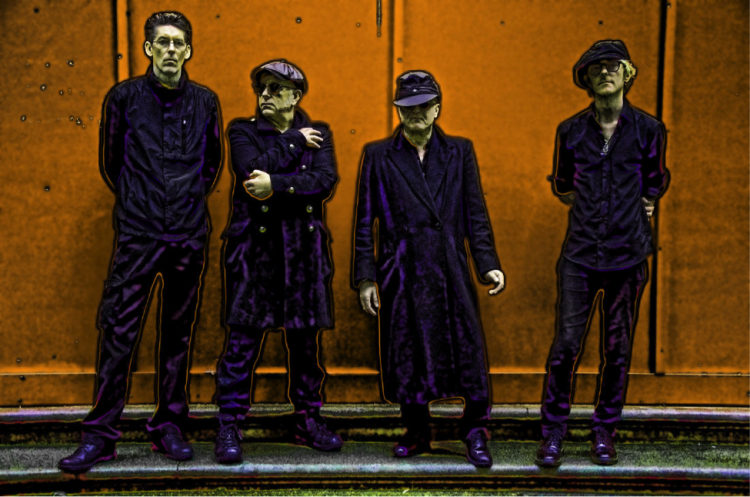
You’ve done numerous collaborations with the likes of Lucas Lanthier, Mick Rossi, Dario Argento and Marc Almond, you must have some stories about these sessions to share?
With the exception of Mick Rossi, they were all an absolute pleasure to work and hang out with. Session wise, with both Marc and Lucas, there was an element of working blind to a point. Whilst recording the Hungry Years, Marc had suggested that we do our vocals separately, in keeping with the music which we did spontaneously. He left for the green room whilst I recorded my vocals and vice versa when he did his. So we had no idea of what each other was singing once we had laid the basic track down.
After listening to the finished result, we both felt it worked perfectly and with the edge that Marc had foreseen would result from this particular approach and strategy. I told Marc we needed another section, so I ran down the road to a 24 hour cafe I knew in Soho to write the new piece. I came back 20 minutes later with a chorus in my head, and quickly worked it out on the piano with the help of a big black magic marker on the Steinway piano which Elton John, Bowie, Bolan and numerous other notable artists had used. Marc walked in to the live room shaking his head in disbelief at my desecration of this historic piano. Funny. Anyway, the chorus vocals I told Marc we should do together. That’s exactly what that chorus needed. I remember as we were singing that chorus together in the main live room at Trident Studio, looking up at the control room window where everyone in that room was looking down at us. Marc commented to me later that he had never seen the ‘hard to impress’ Trident staff along with all the Some Bizarre crew, paying such diligent interest. It did feel as a magical moment.
Lucas Lanthier, like Marc, was an inspiration to work with. We did our sections in two different studios, London and LA, but it worked because of similar feel and application. Two minds most definitely on the same page. Dario Argento was a great party animal. Mick Rossi just turned out to be an asshole.
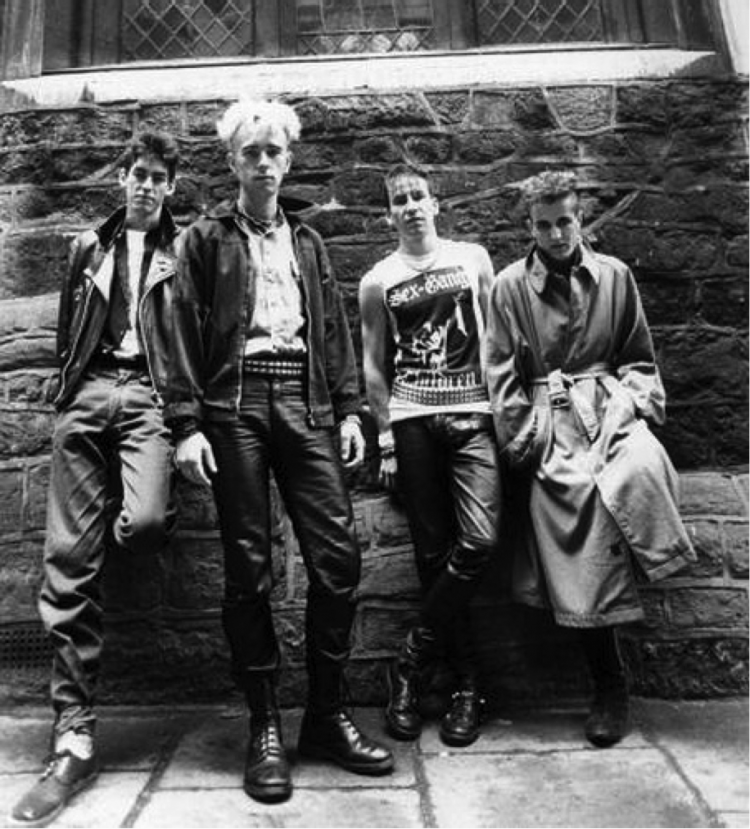
I’m sure I’m not alone in hoping to see new material off the back of this reunion. Has this been discussed?
It has been suggested.
At this point in time with the reunion as well as your ongoing solo shows, staring down the barrel of the future whilst gazing backwards with legs straddling both worlds, is it a time for reflection? What do you see as the next step in this meandering story?
The way is always forward, whist never forgetting where you came from. There is always a validity to one’s past works as well as future conceptions. Art is fluid. Expression is never ending. Until the last breath. I was born an idealist and I will die an idealist.
www.sexgangchildren.com
www.andisexgang.com
www.facebook.com/sexgangchildren/
www.facebook.com/andisexgangofficial/
The reunited Sex Gang Children play the B-52 club in Belgium on May 18 and 19, 2018.
-Andi Lennon

